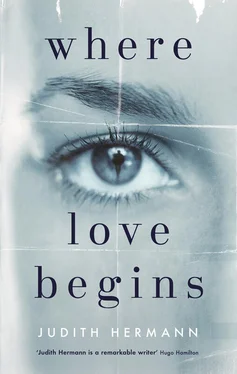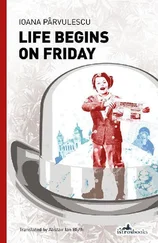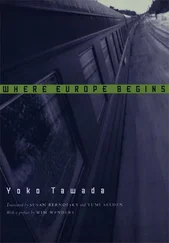He’s managed to turn Stella into a mirror image of himself; so it would seem.
Stella says, she hisses: Come on out. Open the door. Open-the-door. Come on out.
The intercom crackles and she can hear his voice.
This is a private home.
Stella has to laugh at that. She makes a face, leans forward and says, Oh, yes, I know. Damn-it-all, I know that. And I don’t even want to go inside your house. I would like to talk to you; open the goddamn door, open it.
Mister Pfister presses the buzzer. Stella leans against the gate; the gate opens. At the same time the front door opens, and Mister Pfister comes out. Stella sees him step onto the doorsill, and she has the feeling that with the opening of the door a sort of energy escapes the house like a liquid, a stream of thoughts and apprehensions, excess tension, oxidising fear. Mister Pfister looks as if it were the first time in his life he ever opened the door for someone. Walked towards someone, into the brightness, into the light. He sets his feet down like a sick person, just like Walter, Esther, Julia; he comes down the three steps towards Stella, a person who doesn’t trust the ground under his feet. The air is thick. Stella feels she’s starting to perspire; she can hear herself breathe. But her hands are ice cold; her mouth is dry; she visualises Ava, Ava’s soft face, and she can hear her little hoarse voice; she also hears the voice of the bicycle mechanic, You can talk to him, go and talk to him.
Mister Pfister, as far as she can see, isn’t holding anything. He comes towards her with empty hands. He makes a helpless, unambiguous gesture, he gestures at his door — he is inviting her in.
He is inviting her to come into his house, to sit down. To see what his house looks like compared to hers.
He has come outside for Stella; she has got him outside; is it possible, Stella thinks vaguely, that this was what it was all about for him. Again she sees how good-looking he is, how young, and how tired; his face is ashen grey; the expression in his eyes is desperate; he exudes a stale, sour smell; his mouth is childish and much too large. He grimaces; maybe it’s supposed to be a smile. He is attempting something, trying to find a tone, something he can hold on to.
Stella thinks of Jason. On the airplane, of his open hand; she hears herself say, I have a fear of flying. I’m really very afraid of flying, and she hears Jason’s voice, his reassurance.
She shakes her head. I don’t want to go inside your house. And I don’t want to stay long. You asked me a question; I want to answer your question.
Mister Pfister stands still. Stella continues to walk towards him; she could touch him, the dirty material of his hooded sweater; make sure that he really exists. His expression changes from desperation to confusion, then to a questioning lack of understanding.
The piece of paper, Stella says. She spits out the words. Your yellow, filthy piece of paper with the question, What is it like being stalked. Yes?
Mister Pfister nods, it dawns on him, he retraces things. The piece of paper. The question, the preclusion of a conversation, his obsession, piecemeal things seem to occur to him, fragments; he looks as if someone whom Stella can’t see were whispering something into his ear.
It’s horrible being stalked. It’s wrecking my life. It’s wrecking me. I want you to stop it. I want you never again to ring the bell at our house, never again to put anything into our mailbox; I want you to get lost, once and for all. Do you understand. Do you hear me?
It’s a bit like talking to Ava. Somewhat like saying to Ava, You have to keep your hat on your head. You should never cross the street when the light is red. It’s high time you went to sleep now. Do you hear me. Are you listening to me?
Stella has a feeling of incipient nausea; maybe it’s pity; it almost makes her stumble. Why doesn’t she sit down with him on the steps in front of the house, one cigarette-length of time, just for a quarter of an hour, how hard would that be. She can’t. No, she can’t do it.
I just want to talk to someone, Mister Pfister says. He has trouble saying the words, difficulty pronouncing them, word by word, actually unconnected. To talk with somebody. I didn’t know. I didn’t know that it is terrible for you.
It is. It’s terrible. And I’m not the right person, Stella says gently. She says it almost affectionately. You have to understand that I’m not the right person for that. You have to find someone else; we have nothing to do with each other; don’t you see that? I’m not the person you think I am. I’m a completely different one.
How odd to say — but I’m not the right one. Simply to reject the look of another person. How do I know, Stella thinks, that I’m not the right one; where did I get that from.
They stand facing each other, looking at each other; Stella looks at Mister Pfister; she can see him, she’ll never forget him. His green eyes, a yellow circle around the shaded iris, and behind the weariness, concealed amusement. His large mouth, a sickle-shaped scar on his upper lip, an expression of being overtaxed and at the same time knowing better. His posture, the total opposite of Jason’s posture, of the bicycle mechanic’s, his limp, tormented aura.
He extends his right hand. Chapped skin, flaky, incapable of squeezing something tight, of holding on to something. Stella raises her hands; she shows him her palms; it is impossible. Her hands. Good Lord. He pulls his hand back.
I wish you well.
Stella turns around. She sees the gate slamming shut before her, but that’s only an illusory sequence, a panicky image, the gate is open and she walks through it and back out to the street, pulling the gate shut behind her without turning around again. She is trembling; everything is trembling.
*
Mister Pfister comes by that afternoon.
Did she assume he wouldn’t come any more? Did she seriously think the matter was finished, that she could turn to other things (a page in a book, a poem, the magazine section of the Sunday paper, harvesting raspberries, cleaning windows); did she think she had done everything right.
She hadn’t.
Mister Pfister rings that afternoon at three o’clock, and Stella gets up out of her chair behind the house, and not taking the time to put her shoes back on, she walks barefoot across the lawn and towards the gate, towards Mister Pfister, she runs. He’s standing there, waiting for her, looking towards her. The bicycle mechanic was wrong.
Stella follows the House Rules. She lets anyone in, whoever-may-come. She pulls open the gate, Mister Pfister is not shocked by this, but he does take a small step back, only a small step, and without averting his fervent gaze from Stella’s face.
Stella says, You can’t leave it alone. It isn’t possible, or what. Impossible for you, or what. She has the feeling that she is white with rage. She feels she can’t see properly; all the contours are much too precise, they hurt her eyes.
Mister Pfister says, No, no, not possible. It’s impossible, I can’t let it be. Can’t let it be.
He is standing in front of her on the street, quivering.
I slept on it. I went back to bed again. You have to understand, I slept on it, I thought about it. And I woke up, and I think I don’t agree. And I won’t stop. I’ll not only kick in your garden gate, I’ll also kick in the door to your house. I’ll trample your entire life to pieces; it’s something I can do. You’ll lie under the bedcovers and bite your fingernails; your teeth will chatter.
Stella hears him, but can’t comprehend any of it. She holds onto the gate and hears something in Mister Pfister’s speech tip over and then splinter. His mother. Every evening. The nights. Hooks and systems, the police, as far as she can follow him, he is inviting her to go to the police. She listens — it’s like listening to Walter — and she sees in his face the splintering of the words; she can actually read it, and she can also see that he senses this and wants to hold it back and cannot hold it back. He looks awful. And in spite of that Stella thinks that she wants to kill Mister Pfister, shoot him, beat him to death, stomp on him, cut him into pieces like paper, here and now, on the spot. To stop this. So that it can just stop.
Читать дальше












